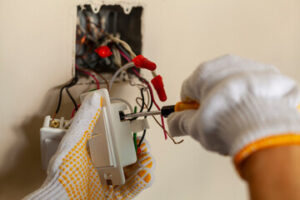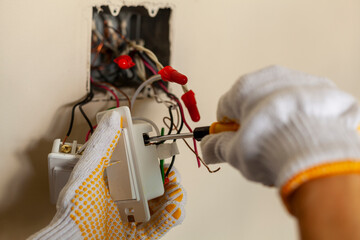Residential electricians specialize in installing and repairing electrical wiring and devices in residential homes. They may work for electrical contractors or on their own as independent contractors. The job is challenging and demanding, and it is essential to follow all safety procedures. Electricians often work nights and weekends to address emergencies in private residences.
 As the name implies, residential electricians work on electrical systems in homes and other buildings. Electrician Fort Lauderdale are responsible for installing, troubleshooting, and maintaining these systems. They often work on low-voltage systems, such as doorbells, thermostats, landscape lighting, and other devices that operate at less than 100 volts. These devices require special knowledge and skill because they are more sensitive to voltage fluctuations and other influences than higher-voltage systems such as the wiring in a home or building.
As the name implies, residential electricians work on electrical systems in homes and other buildings. Electrician Fort Lauderdale are responsible for installing, troubleshooting, and maintaining these systems. They often work on low-voltage systems, such as doorbells, thermostats, landscape lighting, and other devices that operate at less than 100 volts. These devices require special knowledge and skill because they are more sensitive to voltage fluctuations and other influences than higher-voltage systems such as the wiring in a home or building.
In addition to working on new electrical systems in existing homes, some residential electricians are involved in constructing commercial and residential buildings. These projects typically involve planning the layout of electrical systems and ensuring that they follow all relevant codes and regulations. These electricians also frequently have to inspect and test wiring, equipment, and other fixtures to ensure that they are in good working order. Many of these electricians are also called on to assist with the installation of emergency power systems and backup generators in both new and older homes.
A good residential electrician is skilled in reading and interpreting technical diagrams. They must also be able to effectively communicate with their customers and clients. This is especially important if they are working in someone’s home, where they must be respectful and courteous of the people who live there.
Because they deal with a wide range of issues in people’s homes, residential electricians must be knowledgeable about many different types of technology. For example, if a homeowner wants to install a solar energy system, the electrician must know how to wire the system correctly and make sure it is compatible with the rest of the house’s electricity system.
Because of the variety of issues that can arise in a person’s home, residential electricians must be prepared to spend time on the road. This means they may have to travel to a number of different houses on any given day, or they may be required to stay at a single location for an entire day while installing a whole-house generator, for instance.
Education and Training Requirements
A residential electrician must complete on-the-job training through an apprenticeship program or attend a vocational school. Vocational and technical schools often offer two-year associate degrees in electrical technology. Some programs offer specializations like renewable energy or industrial electrical technology. Others focus on specific areas of the field, like residential wiring or home security.
Depending on the state, you may be required to pass a written and practical exam before becoming a licensed electrician. These exams are administered by the state’s licensing authority. You can prepare for the exam by taking an online certification course. However, online courses do not provide you with the hands-on experience you need to fulfill your state’s licensure requirements.
You must have excellent problem-solving skills to succeed in a career as a residential electrician. Most of your work involves troubleshooting and repairing existing electrical systems, so it’s important to understand how the system works. This includes understanding the wiring diagrams and knowing which tools to use for different tasks. It’s also important to understand the physics behind electricity so you can make informed decisions when installing new circuits and devices.
A residential electrician installs a wide variety of household technologies, including home security systems and air conditioning units. Many of these devices require high voltage and need to be installed correctly to avoid dangerous malfunctions. Other electrical installations include lighting and control systems, generators, and electric car charging stations.
In addition to having the necessary skills, a good residential electrician needs to have a strong work ethic and the ability to follow safety procedures. They must also be able to read and understand work orders, which are usually delivered via email or on paper. The ability to prioritize and organize is important, as are customer service skills. Finally, a residential electrician must be able to work independently and have good physical endurance.
A career as a residential electrician offers you the opportunity to earn an average salary of $41,500. If you are a skilled electrician, you can increase your earnings by seeking out more complex and challenging projects. This will help you gain more experience and improve your chances of getting hired by a reputable contractor.
Licensing Requirements
Residential electricians work in customer homes, which means they need to effectively communicate with customers and be respectful of private spaces while performing electrical work. They must also understand the local codes and regulations and know how to safely install or repair wiring. Licensing requirements vary from state to state, but most require several years of classroom instruction and hands-on work experience.
To become a licensed residential electrician, you must pass a written and practical exam. The exam covers the installation, repair or replacement of wiring and devices that distribute electricity. In addition to passing the exam, you must submit notarized documents proving that you have 7 years of practical work experience under a licensed journey electrician. In some states, education or training may substitute for part of the work experience requirement.
Electrical contractors must have general liability and workers’ compensation insurance. Residential electricians who work for themselves must carry personal property and professional liability insurance, as well.
Whether you’re working on a new house or an older home, you’ll need to be familiar with the National Electric Code (NEC). This is the standard that determines how and where wiring should be placed in houses and buildings. Its goal is to prevent fires and other accidents from occurring.
You’ll also need to know how to install and replace GFCIs, smoke detectors, receptacles and light switches. In older homes, you may encounter knob and tube (K&T) wiring, which needs to be replaced with up-to-date industry wiring. This requires the skills of a master electrician to ensure it’s done properly and meets current NEC standards.
The tools of the trade include wire strippers, cutters, crimpers and power drills. Some of these are specific to the job, such as those that are designed to cut through studs at right angles, or ones that can be used to install Romex in plastic boxes that are nailed to a stud. You’ll also need a wrench that can be used to tighten or loosen screws on fixtures and electrical devices.
Some states regulate licensing and permitting at the county or municipal level. For example, the City of New York requires electrical contractors to obtain permits before beginning any work on a job. You must also register your business with the local government and pay taxes.
Work Environment
Residential electricians typically work on wiring systems and electrical components like light fixtures, receptacles and outlets in homes or apartments. They may also install and repair specialized power systems, such as those used to run home automation equipment. In addition, these professionals might work on large-scale projects, such as installing electrical wiring in new commercial buildings. They might also be responsible for ensuring that the work they do meets all local and state regulations.
In order to decide whether to specialize as a residential or commercial electrician, it’s important to consider a number of factors, including career path options, the scope of work and interactions with clients. For example, a residential electrician will likely have less opportunity to advance within their field than a commercial electrician. Additionally, residential electricians may earn slightly lower salaries than their commercial counterparts.
Another thing to keep in mind is the type of work environment that you’d prefer to be in. For example, some people may prefer to work in a high-rise building or with a large number of customers and clients. On the other hand, other people may prefer to have a more hands-on role and interact with homeowners directly on a daily basis.
The work environment of a Residential Electrician is often different from that of a commercial electrician, but there are some similarities as well. Both specializations require extensive knowledge of electrical codes and systems. In addition, they both require a high degree of problem-solving skills and the ability to read blueprints.
Both commercial and residential electricians must also work with different types of wiring. Residential electricians often use non-metallic sheathed cable (NM) with a plastic sheath, while commercial electricians tend to work with metal tubing conduits that are designed for larger commercial spaces and power supplies.
Another difference between the two specializations is that residential electricians typically work with voltage systems between 120 and 240 volts, while commercial electricians can work with higher voltage systems. It’s important for these individuals to understand the differences in these voltage systems in order to ensure their safety and the safety of others.
